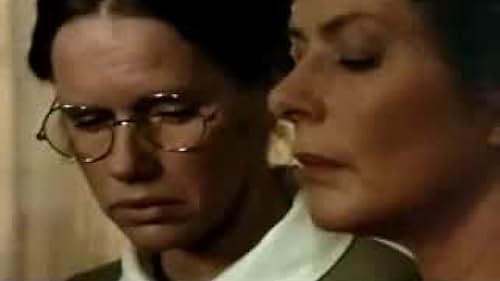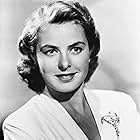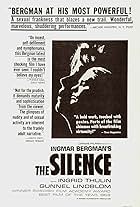A devoted wife is visited by her mother, a successful concert pianist who had little time for her when she was young.A devoted wife is visited by her mother, a successful concert pianist who had little time for her when she was young.A devoted wife is visited by her mother, a successful concert pianist who had little time for her when she was young.
- Nominated for 2 Oscars
- 10 wins & 10 nominations total
Eva von Hanno
- Nurse
- (uncredited)
Knut Wigert
- Professor
- (uncredited)
- Director
- Writer
- All cast & crew
- Production, box office & more at IMDbPro
Storyline
Did you know
- TriviaFinal theatrical feature film of actress Ingrid Bergman.
- GoofsIn the dialogue scene where Charlotte is lying on the floor and Eva is sitting on the sofa behind her, the shadow of the boom mic is visible on the curtains when the camera pans to Eva for a few seconds.
- ConnectionsFeatured in The Making of Autumn Sonata (1978)
Featured review
Before she was an international star of incomparable charisma and beauty, and even before Ingmar Bergman became a legendary director of films bleak and intense, Ingrid Bergman played in the Swedish cinema. So it is entirely apropos that someday Bergman might direct Bergman.
Ingrid plays Charlotte, a concert pianist who has, upon the recent death of her longtime lover, Leonardo, returned to her native land to visit her daughter Eva (Liv Ullmann), whom she hasn't seen for seven years, and her husband Viktor (Halvar Bjork), who is a minister. Ullmann is frumpish in specs with her hair up and her dress loose and ill-fitting. She is Ingrid's nerdish daughter who has been throughout her life entirely overshadowed by her glamorous mother. Eva has an unpleasant surprise for mom. Her other daughter, Helena (Lena Nyman), who suffers from a crippling disease, perhaps muscular dystrophy, is on hand. Eva didn't tell her mother that Helena was now living with them. She says she didn't tell her because she knew that, if she had, Charlotte would not have come. And so we can guess that there are issues that will come out, issues between mother and daughter that have been festering for decades.
I got goose bumps seeing Ingrid Bergman as an elderly woman, and seeing the smooth, graceful style again, the elegant presence, a hint of the old gestures, the sly glances, the tentative smiles... It was really wonderful and at the same time disconcerting to examine her face (Sven Nykvist's intense close ups expose every inch of skin) and sigh and remember and understand the effect of the passing years. Ingrid is elegant but she has been robbed of her beauty so now we are able to see her character; unfortunately Ingmar's script allows little of the real Ingrid Bergman to appear. Hers is not a pleasant part to play. She is an entirely selfish and self-centered woman who has put her career before her family, but is unaware of what she has done. Eva seizes this opportunity to punish her mother by dredging up the neglect of her childhood to throw it in her mother's face (which perhaps explains why Charlotte hasn't been home in seven years). The sheer cold hatred that Eva expresses is enough to make the devil himself cringe. After a bit one begins to feel sorry for Charlotte, despite her failures as a mother, to have a daughter so unforgiving and so hateful.
Liv Ullmann is rather startling in this portrayal, with her penetrating eyes, her hard, Neandethalish forehead, the severe specs, and the uncompromising tone of her voice. Charlotte is ashamed and begs for forgiveness and tries to defend herself, but it is no use. Eva is too strong for her. This is one of the more intense scenes in cinema, and one not easily watched. Meanwhile in the upstairs bedroom and then in the hallway and down the staircase, Helena has heard them arguing and is pulling her crippled body over the floor, desperately trying to reach them. She cries out, "Mama! Mama!" but is not heard.
Viewers might want to pick sides between mother and daughter to say which is the more at fault. Indeed, it is hard to say who Bergman himself found more at fault. Perhaps there is no fault, only human weakness and stupidity. Such scenes are usually followed by a greater understanding, forgiveness and a willingness to start anew. However, although Charlotte wants that, it is not clear in Bergman's script that anything good will come of what has happened. Charlotte leaves, the minister returns to looking at his wife, (having overheard the argument, about which he has said nothing) and Eva writes a letter to her mother. It is not clear whether she wants to patch things up or to gain another opportunity to pick her mother to pieces. The viewer is left to decide.
Perhaps the best scene in the film is the one that follows dinner the night of Charlotte's arrival in which Eva plays the piano, a Chopin prelude. She has worked hard on it and hopes to please her mother. Alas, her play is not so good. After all, the mother is a genius, the daughter only the daughter of a genius. Charlotte sits down next to Eva and takes the keys to gently demonstrate how the piece should be played. We see and feel at once the inadequacy of the daughter in her mother's eyes. It is a great scene filmed with a tight focus on the faces of the two women. When Eva turns to stare at her mother, who is, of course, playing brilliantly with great finesse and touch, the expression on Eva's face, held for many long seconds, is unforgettable.
Not to second guess the master, but I would have liked to have seen the entire movie played in this, a more subtle key than that which followed. However when it comes to dysfunction and disease, Ingmar Bergman is unrestrained.
Ingrid Bergman was nominated for an academy award for best actress in this, her last feature film (she had already been diagnosed with cancer), but lost out to Jane Fonda in Coming Home (1978).
(Note: Over 500 of my movie reviews are now available in my book "Cut to the Chaise Lounge or I Can't Believe I Swallowed the Remote!" Get it at Amazon!)
Ingrid plays Charlotte, a concert pianist who has, upon the recent death of her longtime lover, Leonardo, returned to her native land to visit her daughter Eva (Liv Ullmann), whom she hasn't seen for seven years, and her husband Viktor (Halvar Bjork), who is a minister. Ullmann is frumpish in specs with her hair up and her dress loose and ill-fitting. She is Ingrid's nerdish daughter who has been throughout her life entirely overshadowed by her glamorous mother. Eva has an unpleasant surprise for mom. Her other daughter, Helena (Lena Nyman), who suffers from a crippling disease, perhaps muscular dystrophy, is on hand. Eva didn't tell her mother that Helena was now living with them. She says she didn't tell her because she knew that, if she had, Charlotte would not have come. And so we can guess that there are issues that will come out, issues between mother and daughter that have been festering for decades.
I got goose bumps seeing Ingrid Bergman as an elderly woman, and seeing the smooth, graceful style again, the elegant presence, a hint of the old gestures, the sly glances, the tentative smiles... It was really wonderful and at the same time disconcerting to examine her face (Sven Nykvist's intense close ups expose every inch of skin) and sigh and remember and understand the effect of the passing years. Ingrid is elegant but she has been robbed of her beauty so now we are able to see her character; unfortunately Ingmar's script allows little of the real Ingrid Bergman to appear. Hers is not a pleasant part to play. She is an entirely selfish and self-centered woman who has put her career before her family, but is unaware of what she has done. Eva seizes this opportunity to punish her mother by dredging up the neglect of her childhood to throw it in her mother's face (which perhaps explains why Charlotte hasn't been home in seven years). The sheer cold hatred that Eva expresses is enough to make the devil himself cringe. After a bit one begins to feel sorry for Charlotte, despite her failures as a mother, to have a daughter so unforgiving and so hateful.
Liv Ullmann is rather startling in this portrayal, with her penetrating eyes, her hard, Neandethalish forehead, the severe specs, and the uncompromising tone of her voice. Charlotte is ashamed and begs for forgiveness and tries to defend herself, but it is no use. Eva is too strong for her. This is one of the more intense scenes in cinema, and one not easily watched. Meanwhile in the upstairs bedroom and then in the hallway and down the staircase, Helena has heard them arguing and is pulling her crippled body over the floor, desperately trying to reach them. She cries out, "Mama! Mama!" but is not heard.
Viewers might want to pick sides between mother and daughter to say which is the more at fault. Indeed, it is hard to say who Bergman himself found more at fault. Perhaps there is no fault, only human weakness and stupidity. Such scenes are usually followed by a greater understanding, forgiveness and a willingness to start anew. However, although Charlotte wants that, it is not clear in Bergman's script that anything good will come of what has happened. Charlotte leaves, the minister returns to looking at his wife, (having overheard the argument, about which he has said nothing) and Eva writes a letter to her mother. It is not clear whether she wants to patch things up or to gain another opportunity to pick her mother to pieces. The viewer is left to decide.
Perhaps the best scene in the film is the one that follows dinner the night of Charlotte's arrival in which Eva plays the piano, a Chopin prelude. She has worked hard on it and hopes to please her mother. Alas, her play is not so good. After all, the mother is a genius, the daughter only the daughter of a genius. Charlotte sits down next to Eva and takes the keys to gently demonstrate how the piece should be played. We see and feel at once the inadequacy of the daughter in her mother's eyes. It is a great scene filmed with a tight focus on the faces of the two women. When Eva turns to stare at her mother, who is, of course, playing brilliantly with great finesse and touch, the expression on Eva's face, held for many long seconds, is unforgettable.
Not to second guess the master, but I would have liked to have seen the entire movie played in this, a more subtle key than that which followed. However when it comes to dysfunction and disease, Ingmar Bergman is unrestrained.
Ingrid Bergman was nominated for an academy award for best actress in this, her last feature film (she had already been diagnosed with cancer), but lost out to Jane Fonda in Coming Home (1978).
(Note: Over 500 of my movie reviews are now available in my book "Cut to the Chaise Lounge or I Can't Believe I Swallowed the Remote!" Get it at Amazon!)
- DennisLittrell
- Jun 23, 2001
- Permalink
- How long is Autumn Sonata?Powered by Alexa
Details
Box office
- Gross worldwide
- $39,031
Contribute to this page
Suggest an edit or add missing content





























